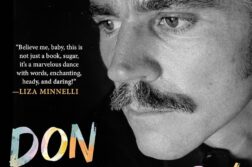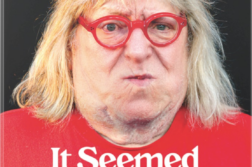THOUGHTFUL, deadpan, prolific, and possessing an encyclopedic knowledge of music, Stephin Merritt can be a tough nut to crack when he’s interviewed, whether by me or by filmmakers Kerthy Fix and Gail O’Hara, who spent a decade shooting the documentary Strange Powers: Stephin Merritt and the Magnetic Fields, which takes a long look at the creative processes behind one of America’s most versatile songwriters.
Born January 17, 1966, having never met his father, folk singer Scott Fagan, Merritt was raised by his bohemian mother. After frequently relocating during his early youth, mother and son settled in Boston, where Merritt attended high school at the Cambridge School of Weston, where his reputation as a musical genius was established.
Using his untrained bass–baritone voice and a vast knowledge of different instruments (his sole hobby is collecting instruments), Merritt formed the Magnetic Fields in 1988 with the classically trained musician Claudia Gonson, who remains the band’s manager and Merritt’s anchor. (Contrary to various pesky rumors, the band gets it name from André Breton and Philippe Soupault’s novel, Les Champs Magnétiques.) Not to be pigeonholed, Merritt has written music in every conceivable genre; the Magnetic Fields, also all over the musical map, are often associated with “synthpop” or indie pop.
Twenty-two years later, after many changes and many a side project, the man some dub “the Cole Porter of his generation” continues to turn out songs of many shapes and sizes, including ones with gay themes, such as “When My Boy Walks Down the Street” and “Zombie Boy.”
Now living in Hollywood, Merritt talked to me about music, politics, and Sir Elton John’s homophobic moments, among other topics.
G&LR: As one of the first openly gay male singers in the pop music industry, how do you think the industry has changed over the years?
Stephin Merritt: You used to have to say you were bisexual. Mark Almond, Boy George did. Morrissey said he was asexual. The Pet Shop Boys said, “It’s none of your business” for a decade. Little Richard said he was bisexual. Now I’m free to be openly gay without getting beat up, but it does hurt my record sales.
G&LR: Open, at least in LA.
SM: Right, I had a bottle thrown at me in Philadelphia.
G&LR: How about the lyrical content? Can you be less sexually ambiguous?
SM: Oh, I don’t really do anything adventurous in that way. I have “Zombie Boy,” which has pedophilia and necrophilia. I dealt with miscegenation in addition to being gay, but that song’s so over-the-top I don’t think anybody would take it seriously as a gay statement anymore than a necrophiliac statement. I don’t particularly feel there needs to be any ground broken around openly frank, sexually explicit lyrics.
G&LR: Do GLBT issues influence your songwriting?
SM: I’ve written a few songs that have been taken to mean something about gay marriage, and I certainly feel strongly about gay marriage, but I don’t think I would want to write a song that goes: “Please vote for gay marriage/ It’s Important.” For one thing, once people vote for gay marriage the song will become archaic; or worse, the song becomes ironic because gay marriage becomes law because of a U.S. Supreme Court ruling rather than anyone voting for it. In that case, “Please vote for gay marriage” would undermine itself and its message. I don’t think it’s that good of an idea to be that directly political in a song.
G&LR: Then what role does politics have in art or in songwriting?
SM: Politics has a role in shaping art, certainly. But songwriting is generally not a very good advocacy forum—at least not for current politics. It can certainly advocate for peace and love, which was done ad nauseam in the 1960’s and 70’s. I really only parody that. I don’t necessarily believe in peace and love anyway.
G&LR: What do you mean?
SM: I don’t think peace and love are good ways of getting what you want. If you’re an advocate for gay marriage, then peace and love are not going to get you there.
G&LR: What role do artists have to engage in the public political dialogue?
SM: Artists are generally considered “nutty people” whose opinions are not to be taken seriously, and in fact can undermine causes by espousing them. Allen Ginsberg said, “Yeah, I’m a member of nambla [North American Man/Boy Love Association]. Everyone who loves boys should be.” That did not do any favors for the people who were trying to lower the age of consent or make the age of consent uniform. That was not a good idea.
G&LR: How about someone like Elton John who has done duets with known homophobes Axl Rose and Eminem and recently performed at Rush Limbaugh’s fourth wedding last June?
SM: Yes, and he goes to Dubai, where homosexuality is illegal. Interesting. Elton John is of a different generation than I am, and these things don’t bother him like they would bother me. He probably doesn’t even feel constrained, particularly. He’s Sir Elton John. He can do whatever he wants in Dubai and nobody’s going to actually punish him. Once you have a “sir” in front of your name, anything anyone does to you in a foreign country becomes an international incident.
G&LR: Having said that, what do you think of his collaborations? Does he have a responsibility to bridge the gap between gay artists and homophobes?
SM: Their personal homophobia doesn’t matter. What matters is the homophobia of the audience. It’s probably in some ways a good idea to have someone openly gay connecting with the presumably somewhat homophobic audience. I don’t know if I would disapprove of him doing that, nor do I think he would give a shit if I disapproved. Nor do I think I have any particular right to disapprove of Elton John’s behavior.
G&LR: People frequently talk about your music and that of the Magnetic Fields under various genre labels—synthpop, indie pop, and so on. Is that confining?
SM: There are some genres naturally existing in the world—musicals, theater music, heavy metal. Heavy metal is pretty descriptive and everyone knows what it is and anyone can do it. Pat Boone’s heavy metal album [In a Metal Mood] was really a heavy metal album even though Pat Boone did it. It’s not an oppressive construct that patronizes or excludes people like country & western or indie rock or rock or folk or gay music, all of which have some entrance requirements.
G&LR: How did you feel about being the subject of a documentary?
SM: They never actually asked me. It faded into existence. It was my friend Gail occasionally shooting some video of me and other people. Gradually it became a documentary. How do I feel about it? I don’t really know. I didn’t know I was seeing the final cut when I saw it, so I wasn’t really paying attention to it. I can form an opinion in ten years or so.
G&LR: Well, how do you feel about documentaries or even interviews where you discuss your work and yourself? Do they serve the work? Should the work speak for itself?
SM: The work never really speaks for itself. There are album covers and audience expectations and whatever people are listening to at that time. People are never really responding to rhythms and frequencies; music doesn’t work that way. It doesn’t help me understand it. I feel I pretty much understand it already.




